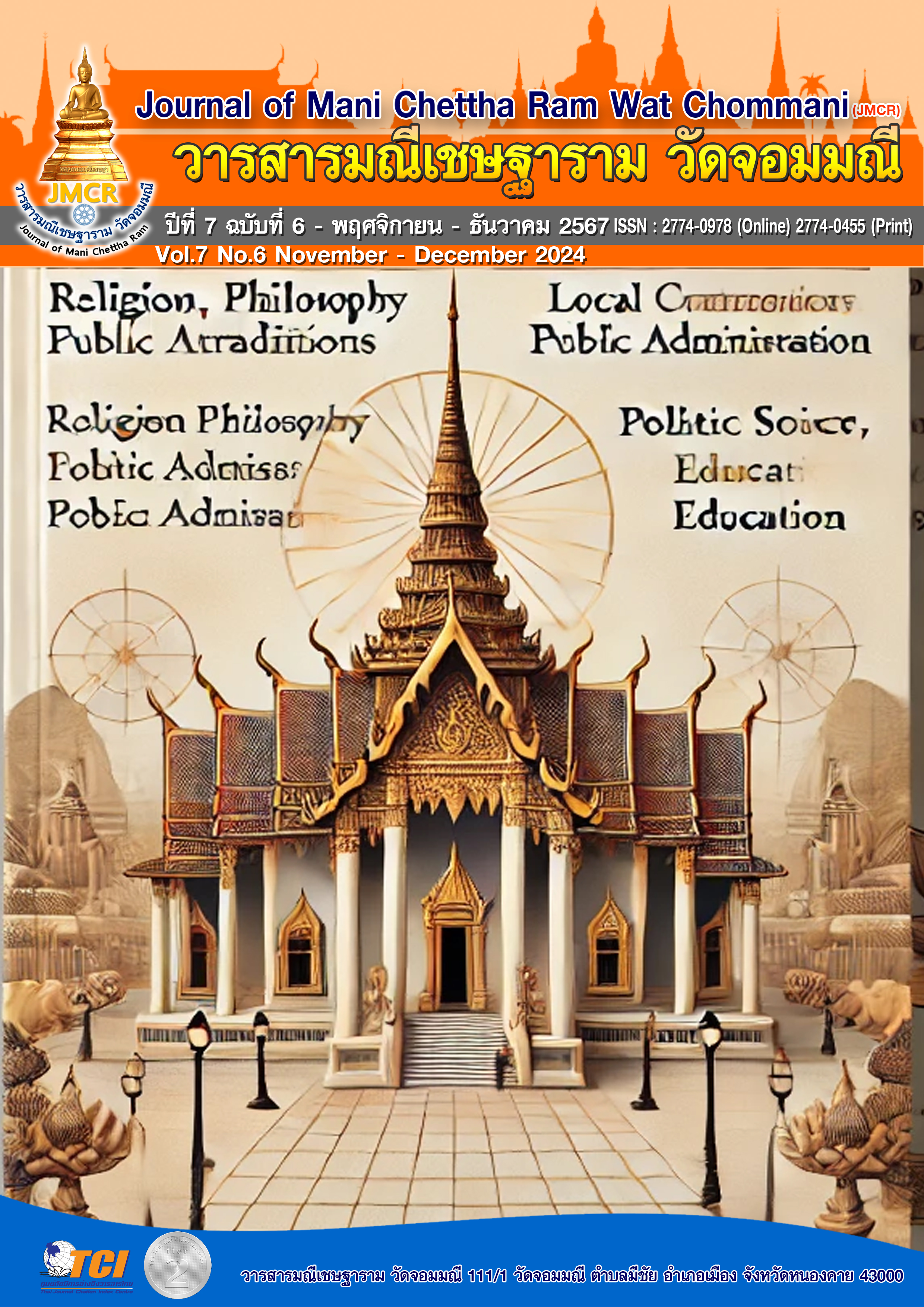DEVELOPMENT OF A PLATFORM TO PROMOTE HEALTH FOR THE ELDERLY FOR SELF-RELIANCE IN THE JAPANESE STYLE IN NONG KHAI PROVINCE
Keywords:
Health Platform, Self-Reliance, Elderly, JapaneseAbstract
Thailand is transitioning into a fully aging society, presenting challenges in ensuring equitable access to quality healthcare services, especially for older adults in Nong Khai Province. These individuals often face difficulties in accessing comprehensive health information and managing their health independently. This study aimed to: 1) develop a health promotion platform for older adults, inspired by Japan's self-reliance approach, and
2) implement the platform in Nong Khai Province. Using an applied research methodology combined with platform design and development, this research sought to enhance the accessibility and safety of health promotion tools for older adults. The study involved a purposive sample of 100 older adults from Nong Khai Province, selected based on criteria such as basic technological literacy and adequate health status to participate in the program. Data collection tools included questionnaires and in-depth interviews designed to evaluate user satisfaction, understanding of the platform, and its impact on overall health.
The evaluation framework was based on the DeLone & McLean Information System Success Model, assessing six key dimensions: system quality, information quality, service quality, system use, user satisfaction, and perceived net benefits. Data analysis utilized descriptive statistics, including mean, percentage, and standard deviation, to present quantitative findings. Qualitative data were analyzed through content analysis and in-depth interview summaries to capture user feedback and suggestions.
The findings revealed that the platform, tailored to meet the needs of older adults, emphasized user-friendliness and data security. Users reported high satisfaction levels, with an average score of 4.08 for ease of use and 4.27 for clarity of displayed information. The platform’s implementation in Nong Khai Province demonstrated its significant role in enhancing health knowledge and empowering older adults to manage their health independently. Users rated the platform highly, with an average score of 4.30 for its contribution to improving self-care capabilities. This study highlights the potential of digital health promotion platforms to address the challenges of an aging society effectively.
References
รศรินทร์ เกรย์ และคณะ. (2563). การสำรวจเชิงตรวจสอบร่วมกับภาคเอกชนเพื่อเผยแพร่เทคโนโลยีจากญี่ปุ่นในการส่งเสริมสุขภาพผู้สูงอายุโดยใช้ระบบการดูแลเชิงป้องกันแบบญี่ปุ่น. วารสารการส่งเสริมสุขภาพ, 21(1), 25-36.
รัชชดา สุขผึ้ง. (2566). ผลของโปรแกรมการเคลื่อนไหวเพื่อการพึ่งพาตนเองแบบญี่ปุ่นสำหรับผู้สูงอายุ เขตสุขภาพที่ 8. วารสารการดูแลสุขภาพผู้สูงอายุ, 17(2), 88-97.
วชิราภรณ์ สินเจริญเลิศ และ ปาริชาติ สาขามุละ. (2566). ประสิทธิผลของการใช้ SSM Program ในการพัฒนาเสริมสร้างกล้ามเนื้อ กลุ่มผู้สูงอายุ อำเภอบ้านดุง จังหวัดอุดรธานี. วารสารวิจัยสุขภาพ, 12(3), 45-53.
DeLone, W. H., & McLean, E. R. (2003). The DeLone and McLean model of information systems success: A ten-year update. Journal of Management Information Systems, 19(4), 9-30.
Carmeli, E., Sheklow, S., & Coleman, R. (2006). A comparative study of group exercise versus home exercise in elderly patients following hip surgery. Journal of Rehabilitation Medicine, 38(3), 170-176.
Kawamata, Y., Yamada, Y., & Kobayashi, M. (2012). Effectiveness of occupational therapy (MOHO) programs in promoting health among the elderly. Journal of Occupational Therapy, 19(2), 135-142.
Bossen, C., Jensen, L. G., & Udsen, F. W. (2013). Evaluation of electronic health records (EHR) using the DeLone & McLean model in hospitals. Health Informatics Journal, 19(2), 95-110.
Changizi, M., & Kaveh, M. H. (2017). Effectiveness of mHealth in modifying health behaviors in the elderly. Journal of Health Promotion, 35(1), 34-42.
Adebowale, O. (2017). Validation of the DeLone and McLean information systems success model in hospital information systems. Journal of Health Information Management, 25(3), 78-84.
Valenzuela, T., Okubo, Y., Woodbury, A., Lord, S. R., & Delbaere, K. (2018). Adherence to technology-based exercise programs in the elderly: A systematic review. Journal of Aging and Health, 30(3), 1-15.
Shim, M., & Jo, S. (2020). Quality factors influencing perceived benefits of health information websites using the DeLone & McLean model. International Journal of Health Information Systems, 15(4), 455-468.




